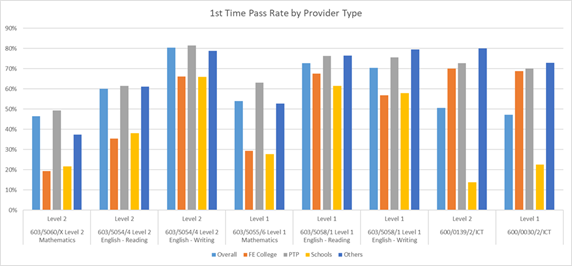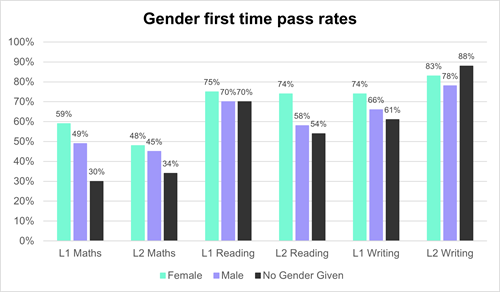Christmas office closure: We’re closing for the Christmas break from 5pm on Monday 23 December 2024 until 8:30am on Thursday 2 January 2025. Learn more.
Functional Skills pass rates 2021-22
Introduction
Following the disruption of previous years, the delivery of Functional Skills during 2021-22 saw a more settled and familiar pattern. In terms of number of assessments, we’ve seen a natural increase in attempts by different learners, aided by the increase in flexibility of assessment versions including paper, online and remote invigilated assessments.
There’s often a lot of attention placed on pass rates and what they mean in comparable terms. It’s worth noting Ofqual’s blog on this matter and that there are many considerations to take on board in relation to learner and centre profiles.
Search our full range of qualifications
Search qualificationsNCFE’s core mission is to shape smarter learning, with English, maths and digital skills being a core foundation to provide this.
One of the key elements of the reform programme was to ensure comparability across Awarding Organisations’ assessments, and this has generally been the outcome, with all the assessments held at a similar level of demand.
We’ve put a variety of support in place to ensure the learner has the best possible chance of achieving their Functional Skills assessments. By using this support, you enhance the delivery experience for your learners and put the best support in place for your learner to achieve.
With our skills assessment tools, you get access to One Assessment (a single initial assessment in 30 minutes for both English and maths) and diagnostics, online resources, and a tracking system through Skills Builder. We also supply Quality Dashboard, a complete reporting system built to support Ofsted which drills down into your data, identifying progression at a learner, cohort, and tutor level.
We offer free access to English and maths specialists, who provide onboarding and curriculum support to tutors, along with free CPD sessions and follow up support to assist delivery. The team has also created learner toolkits to support delivery, which really focus in on those key areas that learners need to develop in. From research we carried out with over 60 centres, those centres who engaged with the team found their attainment improve by up to 5%.
We provide a minimum of 5 sample/past assessment papers and a selection of online sample assessments that allow learners to familiarise themselves with our assessments and system. We also have an online maths tool that lets learners practice using the different tools within the assessment system.
NCFE has our own teaching and learning resources which contain full sessions for delivery of the subject content at all levels, alongside schemes of work, planning and activities. At Level 1 and 2, we have learner workbooks designed to refresh learner’s knowledge and prepare them for the final assessment with sample assessment questions.
NCFE Functional Skills pass rates 1 Aug 21 – 31 July 22
Outlined below are NCFE’s assessment pass rates from 1 August 2021 through to 31 July 2022. This data features all assessments sat during this period.
First time pass rates
0%
Level 1 Maths
0%
Level 1 Reading
0%
Level 1 Writing
0%
Level 1 ICT
0%
Level 2 Maths
0%
Level 2 Reading
0%
Level 2 Writing
0%
Level 2 ICT
Overall pass rates
0%
Level 1 Maths
0%
Level 1 Reading
0%
Level 1 Writing
0%
Level 1 ICT
0%
Level 2 Maths
0%
Level 2 Reading
0%
Level 2 Writing
0%
Level 2 ICT
There are different ways to work out the pass rate, but for this purpose, the overall pass rate is the number of passes as a percentage against the number of assessments taken.
We have not used any CAG or TAG data in the pass rate data on the basis that this is not a fair reflection of the assessment. TAGs were viewed as a measure of last resort by the Department for Education (DfE), and by default, all learners submitted would be given a pass grade. Given the low numbers of TAGs, we felt we could analyse the rates using only the assessments taken.
With the flexibility of Functional Skills assessments, learners are taking assessments at any given time and across a variety of learner backgrounds, which inevitably means that learners are taking assessments more than once.
We have broken down the pass rates using the following methodology:
The ratio of the total number of passes on the first attempt and the total number of first attempts expressed as a percentage for the 2021-2022 session.
The ratio of the total number of passes and the total number of attempts, expressed as a percentage for the 2021 – 2022 session.
Overall attempts tend to be lower than first time pass rates – this is because they are calculated using candidate entries that had their first attempt and then any additional attempts in the 2021-2022 session. For example, a single learner may fail the first attempt, and then go on and have another three attempts before passing.
What we’ve seen across the English and maths assessment is a general improvement in first time pass rates – particularly in maths – for our centres over the last 12 months. While the percentage achieving maths is not as high as pre-legacy levels, the feedback received from customers and learners has informed work to make our assessments more accessible, which is having a positive effect.
We’ve also done some data research on the impact of our Provider Development team, who provide free subject specialist support to tutors, and those centres who engage with the team have seen improvement in attainment by up to 5%.
We’ll be working with centres, through our Provider Development Team, to help support those learners who are repeatedly not achieving, which impacts the overall pass rates.


When we break down the first-time pass rate by provider types, Private Training Providers (PTP) have continued to outperform the other types. As with last year, a lot of learners within PTP are on apprenticeship programmes where English and maths is mandatory, which means that there is financial and employment motivations for the learners to achieve.
The PTP sector is the biggest by far, so our FE College and Schools sector have a smaller sample of assessments – meaning they are more likely to be affected by a large individual cohort performing poorly.
Due to the condition of funding, 16 to 19-year-olds at FE Colleges with a Grade 3 are required to complete GCSE resits, which means the learners who sit Functional Skills are those learners who came out with Grade 1 and 2 at GCSE. The switch from GCSE to Functional Skills can be a challenge, particularly with the large percentage of problem solving in the Functional Skills assessments.
Most of our school sector running Functional Skills are largely alternative provision providers who work hard with learners placed outside of mainstream learning. These learners have struggled with loss of learning during the pandemic, and lack of exam experience will add further anxiety to a challenging learning path.
The ‘Others’ sector features charities, local authorities and adult/community learning that produced a bigger sample size and a more mature learner age group. The pass rate was largely in line with the overall picture for English and ICT.
|
Assessment |
First attempt pass rate |
Overall pass rate |
|
Level 1 Mathematics |
29% |
23% |
|
Level 2 Mathematics |
19% |
16% |
|
Level 1 Reading |
68% |
59% |
|
Level 2 Reading |
35% |
31% |
|
Level 1 Writing |
57% |
52% |
|
Level 2 Writing |
66% |
59% |
|
Level 1 ICT |
69% |
59% |
|
Level 2 ICT |
70% |
47% |
|
Assessment |
First attempt pass rate |
Overall pass rate |
|
Level 1 Mathematics |
63% |
56% |
|
Level 2 Mathematics |
49% |
43% |
|
Level 1 Reading |
76% |
70% |
|
Level 2 Reading |
62% |
55% |
|
Level 1 Writing |
76% |
72% |
|
Level 2 Writing |
82% |
78% |
|
Level 1 ICT |
70% |
58% |
|
Level 2 ICT |
73% |
62% |
|
Assessment |
First attempt pass rate |
Overall pass rate |
|
Level 1 Mathematics |
28% |
27% |
|
Level 2 Mathematics |
22% |
20% |
|
Level 1 Reading |
62% |
59% |
|
Level 2 Reading |
38% |
35% |
|
Level 1 Writing |
58% |
57% |
|
Level 2 Writing |
66% |
60% |
|
Level 1 ICT |
22% |
24% |
|
Level 2 ICT |
14% |
18% |
|
Assessment |
First attempt pass rate |
Overall pass rate |
|
Level 1 Mathematics |
53% |
46% |
|
Level 2 Mathematics |
37% |
33% |
|
Level 1 Reading |
76% |
68% |
|
Level 2 Reading |
61% |
52% |
|
Level 1 Writing |
79% |
68% |
|
Level 2 Writing |
79% |
71% |
|
Level 1 ICT |
73% |
66% |
|
Level 2 ICT |
80% |
60% |
Based on the gender information provided by our providers, we’ve broken down this year’s achievement to gain an understanding on the performance by the different genders.

The data shows us that females are performing stronger than their male counterparts across all assessments. Females make up over 60% of our learners and the difference is most notable in Level 1 Maths.
Closing remarks
Overall, it feels as though things are improving, and with the sector coming together with more support for providers and both Ofqual and Department for Education looking to review the Functional Skills reform content, there is real hope that these improvements can continue. NCFE continues to work closely with both bodies, providing our customers feedback and opinions to inform continuous improvement.
Thank you for your support throughout the past 12 months and remember to reach out should you require any further support from NCFE.

